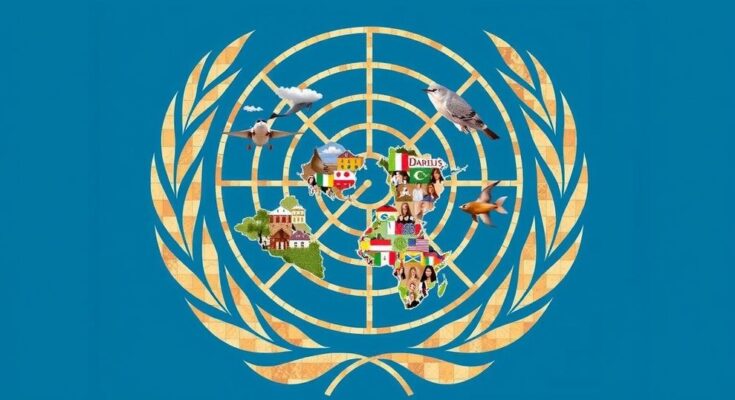The UN climate conference in Baku features global leaders addressing climate change’s impacts, with discussions centered on financial aid for developing nations and a proposed Fossil Fuel Non-Proliferation Treaty. Key polluting nations notably absent, while the U.K. pledges a significant emissions reduction target. Leaders share urgent needs for support against climate-related disasters.
At the United Nations’ annual climate conference held in Baku, Azerbaijan, leaders from various nations convened to share their personal experiences with climate change. Pakistan’s Prime Minister Shehbaz Sharif highlighted his country’s devastating floods, exacerbated by intensified monsoon rains, which have resulted in severe casualties and health issues. Bahamas’ Prime Minister Philip Edward Davis addressed the mounting debt incurred due to climate-related disasters, while Greece’s Prime Minister Kyriakos Mitsotakis expressed concerns over extreme weather patterns impacting southern Europe. Prominent absentees from COP29 included key nations responsible for a significant portion of global carbon emissions, notably the United States, China, India, and Indonesia. Despite this, U.K. Prime Minister Keir Starmer proposed an ambitious target to reduce emissions by 81% from 1990 levels by 2035, furthers the commitments made under the Paris Agreement. The conference primarily focuses on climate finance, aiming to secure assistance from affluent nations for developing countries affected by climate change. A significant topic of discussion is the proposed Fossil Fuel Non-Proliferation Treaty, which advocates for halting the expansion of fossil fuel production and supporting a transition to renewable energy, with backing from various nations and organizations.
The annual UN climate conferences serve as a pivotal platform for countries to discuss and address the global crisis of climate change. The significance of these talks has increased as nations grapple with extreme weather events linked to climate change. Small island nations and developing countries, often the most affected despite contributing minimally to global emissions, seek financial assistance and technological support from wealthier nations to combat the damages incurred by climate-related disasters. The introduction of initiatives like the Fossil Fuel Non-Proliferation Treaty represents a concerted effort to engage the international community in combatting fossil fuel dependency and promoting sustainable practices worldwide.
In summary, the UN climate conference provides an essential opportunity for nations to share their stories and seek collaborative solutions to the ongoing climate crisis. With contributions from leaders experiencing firsthand the effects of climate change, the discussions at COP29 focus on urgent financial aid for vulnerable nations and the promotion of significant policy changes aimed at reducing reliance on fossil fuels. The outcomes of this conference will be critical in shaping future climate action and partnerships.
Original Source: apnews.com




